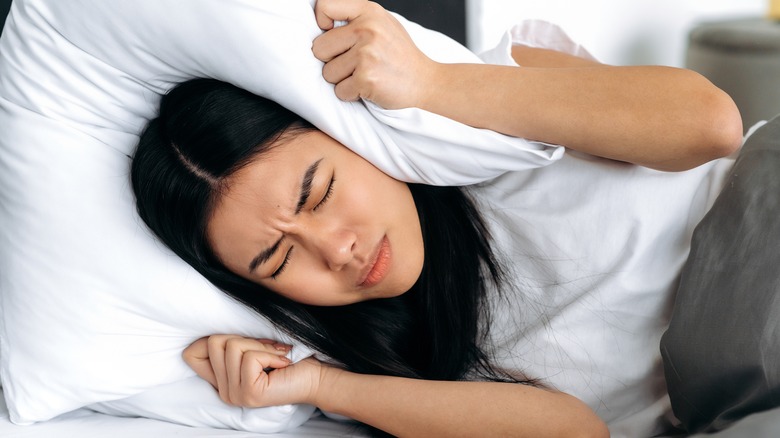Do Dreams Affect Your Sleep Quality? Here's What We Know
What are your dreams like? No, not your dreams for the future — what are your dreams like when you sleep? Whether they're a little fuzzy or easy to recall, you definitely have them. In fact, everyone does, according to Healthline. You, your partner, and even your dog have dreams every night.
These nighttime images can range from sweet to scary to downright strange, but they serve a purpose, according to sleep experts. Cleveland Clinic explains that while researchers are still trying to understand dreaming and its function, the leading theory is that thoughts and visualizations during sleep help the brain process information and prepare for future challenges. Even that random dream about elephants or those nightmares about falling offer a valuable purpose.
Still, some sleepytime fantasies are more pleasant than others, and especially disturbing ones can tend wake you from your slumber. Here's how your dreams could be affecting your sleep quality.
Some dreams could wreck your quality of sleep
We all know how important it is to get enough sleep, but sleep quality is just as essential as sleep quantity. So how do your dreams impact how well you rest at night? According to Sleep Foundation, dreaming is generally associated with good sleep, though it's unclear if dreaming creates high-quality sleep or the other way around. Healthline echoes this, explaining that not dreaming may signal a lack of REM sleep (the sleep stage where dreams most often occur).
However, nightmares may ruin a good night's rest, especially if they happen regularly. Nightmare disorder, where you experience a frequent pattern of scary dreams, can make it difficult to sleep well, leading to fatigue, mental health issues, and trouble functioning in daily life, per Cleveland Clinic.
Occasional nightmares usually aren't thought to be harmful. A 2015 study published in Borderline Personality Disorder and Emotion Dysregulation also found that physiological markers of sleep quality are similar between people who experience nightmares and those who don't. In other words, your body may respond the same, regardless of the type of dream you have. However, the researchers noted that nightmare disorder may still cause symptoms after waking, such as moodiness and fatigue, that require more research.
Can you make yourself have sweet dreams?
Overall, dreams and quality sleep go hand in hand, though nightmares may derail your rest when they become the norm. If you're regularly disturbed by your dreams, a few lifestyle tweaks may help you have sweeter nighttime fantasies. Sleep Foundation suggests taking stock of the stress in your life as well as avoiding eating right before bed. Though it's sometimes easier said than done, managing stress (with meditation or a journaling practice, for example) can keep bad dreams at bay and help you get more restful sleep. For persistent nightmares, consider working with a therapist. They can help you process underlying trauma and rewrite nightmare scripts so you teach your mind to form more pleasant dreams.
A lack of dreams, whether good or bad, could be a warning sign that you're not getting enough REM sleep, but healthy sleeping habits may make it easier to reach this crucial stage. Though it can be challenging at first (especially on those nights out with friends), give yourself a bedtime and stick to it every day, advises Healthline. That way, your body learns when it's time to doze off into dreamland. If you struggle to fall asleep, skip the late-afternoon coffee and incorporate exercise into your routine instead — well before sleeping time. Additionally, make sure your bedroom is an inviting sleepytime oasis. Block out any light, keep the thermostat at a cool (but still cozy) temperature, and turn off distracting devices. Then, you're all set for high-quality sleep and sweet dreams.


